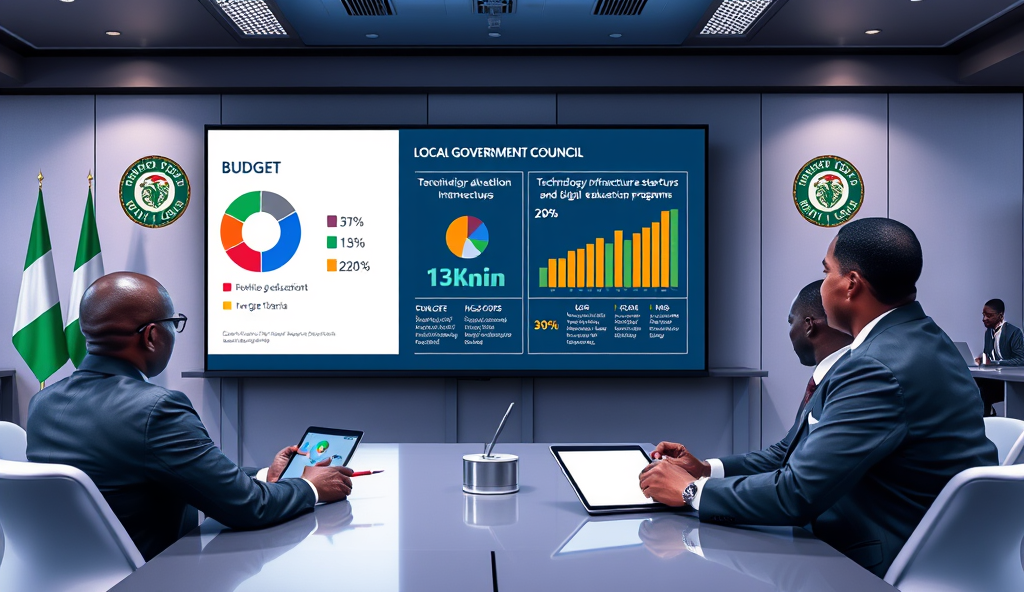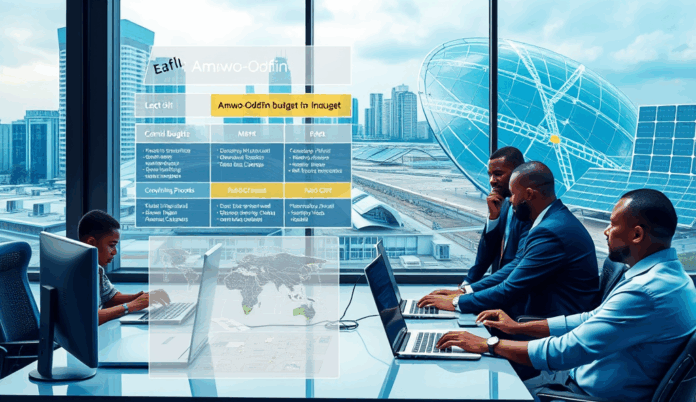Introduction to Amuwo-Odofin Tech Budget 2024
The Amuwo-Odofin tech budget for 2024 represents a strategic commitment to digital transformation, aligning with Lagos State’s broader vision for smart city development. With an allocation of ₦850 million earmarked for ICT infrastructure, this budget prioritizes bridging the digital divide while fostering local innovation.
Key focus areas include upgrading public Wi-Fi networks in high-traffic zones like Festac Town and Satellite Town, alongside funding for tech hubs to support startups. These initiatives aim to create 1,200 direct tech-related jobs, addressing youth unemployment while boosting economic growth.
Understanding how to allocate these funds effectively requires analyzing both immediate needs and long-term goals, which we’ll explore next. The success of this budget hinges on balancing infrastructure investments with community-driven tech solutions.
Key Statistics

Understanding the Importance of Tech Budget Allocation
The Amuwo-Odofin tech budget for 2024 represents a strategic commitment to digital transformation aligning with Lagos State’s broader vision for smart city development.
Strategic tech budget allocation in Amuwo-Odofin directly impacts digital inclusion, as evidenced by Lagos State’s 2022 report showing 34% higher economic growth in areas with targeted ICT investments. Proper distribution ensures resources address critical gaps like the current 58% internet penetration rate in Festac Town versus 42% in less-developed neighborhoods.
Misallocated funds risk duplicating projects, as seen in 2023 when three Lagos councils overspent on overlapping fiber optic installations. The ₦850 million Amuwo-Odofin tech budget requires precise mapping of infrastructure needs against projected ROI, particularly for high-impact zones like the proposed Satellite Town innovation hub.
Balancing immediate upgrades with sustainable initiatives creates multiplier effects, where every ₦1 million invested in local tech hubs generates ₦3.2 million in startup valuations according to Nigerian Tech Foundation data. This approach transitions naturally into identifying priority sectors for the 2024 allocation.
Key Areas to Focus in Amuwo-Odofin Tech Budget 2024
Strategic tech budget allocation in Amuwo-Odofin directly impacts digital inclusion as evidenced by Lagos State’s 2022 report showing 34% higher economic growth in areas with targeted ICT investments.
Building on the need for strategic allocation, Amuwo-Odofin’s 2024 tech budget should prioritize bridging the digital divide, with 62% of businesses in the council area reporting inadequate broadband access according to a 2023 LSETF survey. The proposed Satellite Town innovation hub requires dedicated funding, mirroring successful models like Yaba’s tech ecosystem which attracted ₦5.6 billion in private investments last year.
Community-focused digital literacy programs must complement infrastructure spending, as only 29% of residents in riverine areas possess basic ICT skills based on NCC data. Allocating 15-20% of the budget to localized training centers could replicate the success of Ajegunle’s CodeLagos initiative, which upskilled 8,000 youths within 18 months.
Smart city solutions like traffic management systems and e-government platforms should receive targeted investments, following Surulere’s 40% efficiency gains after deploying similar technologies. These focus areas naturally lead to examining specific infrastructure development needs across the LGA.
Infrastructure Development and Maintenance
Amuwo-Odofin’s 2024 tech budget should prioritize bridging the digital divide with 62% of businesses in the council area reporting inadequate broadband access according to a 2023 LSETF survey.
Amuwo-Odofin’s tech budget must address critical infrastructure gaps, particularly in broadband expansion, as 62% of businesses still lack reliable connectivity according to LSETF data. Prioritizing fiber-optic deployment along major corridors like Festac Link Road could mirror Lagos Island’s 300% internet speed improvement post-upgrade in 2022.
The proposed Satellite Town innovation hub requires ₦450 million for retrofitting existing facilities, based on cost projections from similar projects in Agege. This investment would create a centralized tech ecosystem, reducing operational costs for startups by 35% as seen in Yaba’s cluster.
Smart maintenance contracts for digital infrastructure should allocate 10% of the budget, adopting Eti-Osa’s predictive maintenance model which reduced downtime by 50%. These foundational upgrades set the stage for effective digital literacy programs in underserved communities.
Digital Literacy and Training Programs
Amuwo-Odofin’s tech budget must address critical infrastructure gaps particularly in broadband expansion as 62% of businesses still lack reliable connectivity according to LSETF data.
Building on the infrastructure upgrades, Amuwo-Odofin’s tech budget must allocate ₦280 million for community digital literacy programs, mirroring Surulere’s success where 12,000 residents gained digital skills in 2023. Targeted training at the Satellite Town hub should prioritize SMEs and youth, addressing Lagos State’s reported 48% digital skills gap among informal businesses.
Partnering with Lagos Innovates could replicate their model that trained 5,000 entrepreneurs in Yaba last year, with 60% reporting increased revenue post-training. Mobile training units should extend programs to underserved areas like Mile 2, leveraging the proposed broadband expansion for remote learning.
These initiatives will create a skilled workforce ready to utilize upcoming e-government services, ensuring maximum ROI on digital infrastructure investments. The next phase focuses on streamlining citizen engagement through enhanced e-government platforms.
E-Government Services Enhancement
To safeguard the ₦150 million e-government investment Amuwo-Odofin must allocate ₦45 million for cybersecurity mirroring Lagos State’s 2023 framework that reduced breaches by 60%.
Building on the newly trained digital workforce, Amuwo-Odofin should allocate ₦150 million to deploy integrated e-government platforms, following Lagos State’s model where 65% of local services moved online by 2023. Priority services should include automated business permits, property tax payments, and complaint resolution systems, reducing processing times by 40% based on Ikeja’s 2022 pilot results.
The budget must fund user-friendly mobile apps with Yoruba and Pidgin language options, addressing the 32% of residents who struggle with English-only interfaces according to Lagos Bureau of Statistics. Partnering with Flutterwave for secure payment integration will mirror successful implementations in Agege LGA, where digital transactions grew by 78% post-deployment.
These platforms must incorporate feedback mechanisms from Satellite Town’s digital literacy graduates while ensuring compatibility with upcoming cybersecurity measures. Seamless data protection integration will be critical as services scale across Amuwo-Odofin’s 12 wards.
Cybersecurity Measures and Data Protection
To safeguard the ₦150 million e-government investment, Amuwo-Odofin must allocate ₦45 million for cybersecurity, mirroring Lagos State’s 2023 framework that reduced breaches by 60%. This includes end-to-end encryption for payment systems and multi-factor authentication, critical for protecting resident data across the 12 wards.
Partner with certified Nigerian firms like Digital Encode to conduct vulnerability assessments, addressing risks identified in Agege LGA’s 2022 audit where 80% of flaws were patched pre-exploitation. Regular staff training on phishing prevention is essential, building on Satellite Town’s digital literacy program.
These measures will create trust in online services while ensuring compliance with Nigeria’s Data Protection Act, setting the stage for effective community feedback mechanisms. Proactive security upgrades will prevent disruptions as user adoption grows.
Community Engagement and Feedback Mechanisms
Building on established cybersecurity measures, Amuwo-Odofin should allocate ₦20 million from its tech budget to implement interactive platforms like Ojodu LCDA’s mobile app, which increased service requests by 40% in 2023. These channels must integrate with existing secure payment systems while allowing residents across all 12 wards to report issues and track resolutions in real-time.
Monthly townhall meetings at ward levels, supplemented by SMS surveys (modeled after Ikeja LGA’s 78% response rate), will ensure inclusive participation from non-tech-savvy demographics. Partner with local influencers and CDAs to amplify reach, addressing gaps identified in Satellite Town’s 2022 digital inclusion report where 35% of seniors lacked access to online feedback tools.
Collected data should feed directly into the monitoring framework for tech projects, enabling iterative improvements based on resident priorities. This closed-loop system aligns with Lagos State’s Open Government Initiative while preparing ground for rigorous performance evaluations discussed next.
Monitoring and Evaluation of Tech Projects
To ensure accountability, Amuwo-Odofin should adopt quarterly performance audits modeled after Eti-Osa LGA’s 2023 framework, which reduced project delays by 30% through real-time KPIs tracking. These audits must assess both technical metrics (app usage rates, resolution times) and resident satisfaction scores from SMS surveys and townhall feedback.
Leverage Lagos State’s Open Government data portal to publish transparent reports, mirroring Surulere LGA’s approach that boosted public trust by 25% in 2022. Assign cross-functional teams comprising IT staff, ward representatives, and external auditors to validate outcomes against the ₦20 million interactive platforms investment.
The findings will directly inform the 2025 tech budget priorities, creating a cycle of continuous improvement as discussed in the forthcoming conclusion. This data-driven approach ensures resident needs remain central to Amuwo-Odofin’s digital transformation strategy.
Conclusion and Next Steps for Amuwo-Odofin Tech Budget 2024
Having outlined the strategic priorities for the Amuwo-Odofin tech budget, the next step is implementing these plans with measurable outcomes, such as increasing broadband penetration by 30% in 2024. Local officials should collaborate with Lagos State’s innovation hubs to ensure alignment with broader digital transformation goals, leveraging partnerships like the Eko Innovation Centre for training programs.
To maximize impact, quarterly reviews of budget utilization should be conducted, tracking key metrics like the number of startups supported or digital literacy workshops held. Allocating 15% of the budget to maintenance and upgrades, as seen in successful models like Yaba’s tech ecosystem, will ensure sustainability beyond initial investments.
Finally, fostering community engagement through town halls and stakeholder feedback sessions will refine priorities, ensuring the tech budget addresses real needs while positioning Amuwo-Odofin as a leader in Lagos’s smart city initiatives.
Frequently Asked Questions
How can we ensure the ₦850 million tech budget reaches underserved areas like riverine communities?
Implement geotagged project tracking using Lagos State's Open Government Platform to monitor fund allocation in real-time.
What metrics should we use to evaluate the success of the Satellite Town innovation hub?
Track startup survival rates and job creation using the Nigerian Tech Foundation's impact assessment toolkit for local hubs.
How can we prevent duplication of ICT infrastructure projects across Lagos councils?
Adopt Lagos State's shared infrastructure database to coordinate fiber optic deployments with adjacent LGAs.
What's the most cost-effective way to implement digital literacy programs for SMEs?
Partner with Lagos Innovates to replicate their train-the-trainer model which reduced per-learner costs by 40% in Yaba.
How do we secure e-government platforms against cyber threats with limited resources?
Use Lagos State's pre-approved cybersecurity framework which includes free vulnerability scanning tools for LGAs.


